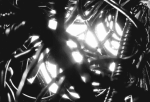I stumbled at random on a Youtube link that ended up full of interesting suggestions. There are a number of class sessions at Yale on American literature that are public.
I started from the one about “Everything is Illuminated” by Jonathan Safran Foer. I haven’t read the book but I knew it was kind of controversial, so I thought it could be interesting to hear about it. Listening through the lesson was indeed very interesting since the teacher makes many links about other writers and styles, especially explaining some notions of post-modernism. I noticed for example how Franzen essentially copied David Foster Wallace’s intent (trying to put together the formal play of the post-modern novel and wrestle it so it can submit to the service of the human sentiment), or the internalization within the novel of a double for the reader, in order to cue or even trick and mislead (Nabokov), the alternate endings of Roth, or putting himself within the novel, or writing about writing (a form of “thinking about thinking”) and certain other “inversions”. And also this ideal of literature as “both sentiment and formal play”. Then when she talks about the themes of the novel she seems to describe Kabbalistic ideals (“desire”, “light”, “connectedness”), which suggests me that when a writer sets to an ambitious journey the themes end up being quite the familiar ones. Each writer adding his own perspective and particular slant, but the core has an idea of stability and constancy, as constant is the pretense of Kabbalah to describe humanity.
Then I moved to listen about “The Crying of Lot 49” (that I’m reading) and this is even more interesting because she goes through a number of literary movements and their position in regard to the perception of reality (within the context of language), and it seems that more than talking about that novel she’s now actually talking directly to me.
It seems that all writers, past and current, end up engaging with this (she expressly calls “the history of literature’s forms and ambitions”). It also seems that more than adding new angles they merely describe different faces of the same thing, in a surprisingly coherent way. I’m wondering here if Scott Bakker really got it and encapsulated the struggle of centuries. I kind of smirk when she (teacher in the video) goes with “the relationship imagined between those visions of language and what is happening outside of fiction, in what we might call the real world”.
For example she says that beginning with O’Connor “embodying a new critical craft of fiction imagining that that craft is reflective of a transcendental order in the world”. Then the Beat Generation and how they did instead reject formalism, or the language mediating with reality. Then passing to the idea (of Nabokov, she says) of the literary work (of art) so autonomous from the world that it could become something like a form of life (and the conceit of author’s immortality, which I guess today is replaced by the “death of the author”). Then to Salinger, believing that the formality of language could lead to communicate the truth of human soul (as in opposite to the Beat Generation, and that I interpret as a kind of solipsistic bliss). Then to Barth who did not believe in the possibility of reaching an unmediated reality, and in this moving closer to Bakker’s perspective and language as a “cage”. She says: “Barth’s idea of language as preceding human understanding”. As a form through which we understand reality, and so not merely mediating, but shaping and “walling” our understanding. Or (and she kinds of quotes this):
The Language That Comes Before
Which also lead me to a pattern of thought about “truth as disabling”, since we always see at the opposite, truth as enabling. What if truth breaks the toy, and what if many writers, in discovering that, recoiled?

